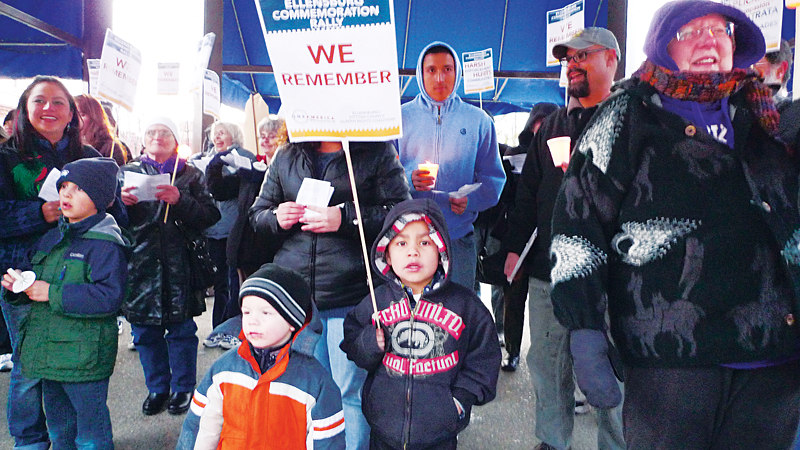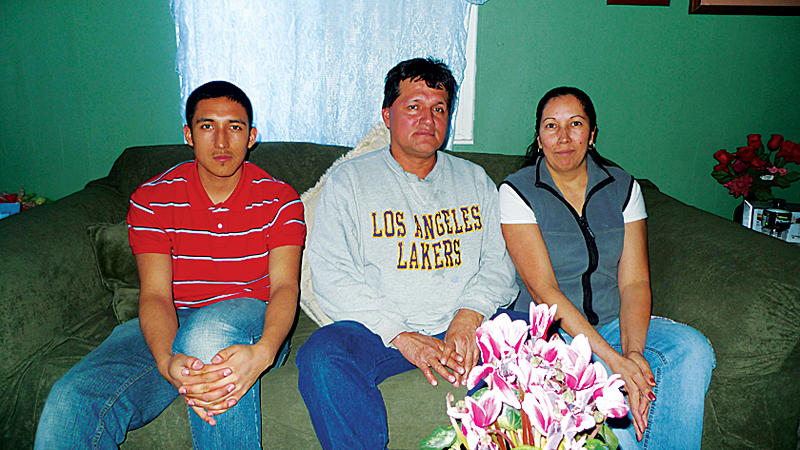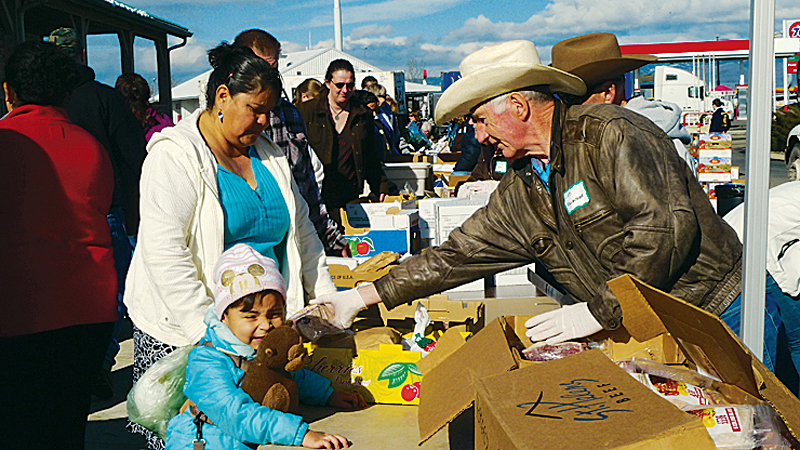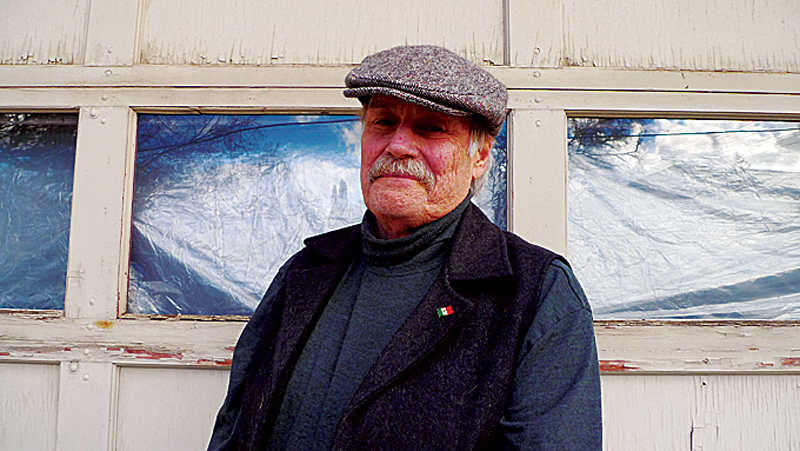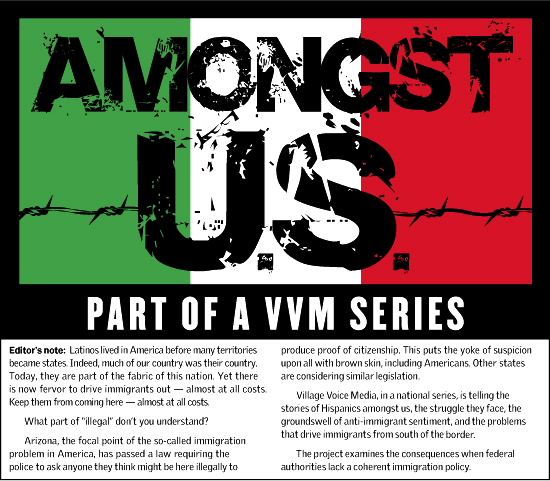Three hours before dawn on a frigid Thursday in January, more than 50 agents from nine federal, state, and local law-enforcement groups gathered at the Kittitas County Fairgrounds in Ellensburg, Washington. In the same buildings that host the roping and riding events during the city’s annual rodeo, the lawmen planned a roundup.
They hoped to arrest at least 34 people and serve 11 search warrants, the culmination of a year-and-a-half-long Immigration and Customs Enforcement (ICE) and Homeland Security investigation into “the manufacture and purchase of counterfeit identity and employment documents,” a statement issued the next day proclaimed.
Two ICE agents briefed several members of the Ellensburg Police Department on their assignment. The local cops were to help apprehend one of the prime suspects, a 38-year-old Mexican man named Gilberto Barrientos-Ariza, and his wife, Maria Morales-Fierro. Though he stands just 5 feet 5 inches tall, Barrientos-Ariza has a criminal record that includes charges of malicious mischief, reckless endangerment, and drug possession—enough to convince the authorities that arresting him at his family’s trailer would be a “high-risk entry” that would require a team of at least seven armed men, according to an Ellensburg Police Department report.
Barrientos-Ariza also is the pastor at a small Pentecostal church in Ellensburg. But the feds suspected that he and his wife, who worked as a maid at Ellensburg’s Quality Inn, were forgers. They told Ellensburg police that somewhere in the couple’s house they would find “the document production equipment from which a large number of other counterfeit documents in the community had come.”
Around 6:40 a.m., the cops and agents descended on Barrientos-Ariza’s trailer park, a hodgepodge of about 30 ramshackle single-wides clustered haphazardly on unpaved streets on the town’s western edge. They carried a picture of Barrientos-Ariza’s house to ensure that they knocked on the right door. A police helicopter hovered overhead, its search beam shining in the early-morning twilight.
Andrew Houck, a bilingual officer on the Ellensburg police force, was first up the steps to the Barrientos-Ariza residence. Houck wrote later in a report that he kicked the front door “to announce our presence.” The door “flew open” and Houck shouted, “Police! Search warrant! Come to the door!”
Barrientos-Ariza was standing in the kitchen, clad in nothing but his underwear. Houck ordered him in Spanish to put his hands up, then pinned him against the wall. Once handcuffed, Houck ordered Barrientos-Ariza to lie on the floor.
The other officers roused Morales-Fierro from bed and handcuffed her, along with the couple’s 19-year-old nephew. Their two children, ages 11 and 14, were in another bedroom when the police burst in with their guns drawn “at the low ready,” according to the police report. They considered handcuffing the kids but decided against it, ordering them instead to sit on the living-room couch, but not before searching it for weapons and evidence.
The cops scoured the residence for nearly four hours, going so far as to check cereal boxes for contraband. In the end, according to Ellensburg Police’s “agency assist” report, they found the couple’s bank statements, driver’s licenses, pay stubs, and Mexican birth certificates. They also found Social Security cards and “pictures of a male which had been cut to what appeared to be placed within an identification card.”
As Barrientos-Ariza’s home was being turned upside down on January 20, ICE agents coordinated actions at 22 other residences in and around Ellensburg, primarily in trailer parks that cater to low-income Hispanic families. Across town at Millpond Mobile Manor, 17-year-old Ricardo Gonzalez says loud knocking and his mother’s screaming woke him up.
Lanky with a thin mustache, the soft-spoken Gonzalez recalls from a seat in his family’s living room how the police told everyone in his house to come out with their hands up. When he opened his bedroom door, Gonzalez says the agents aimed their weapons at him. “They had a laser scope on the gun,” he says. “They pointed the scope at me, in my face. They were, like, ‘Put your hands up!’ Then they pointed it at my legs. They had, like, big guns.”
Gonzalez says he and his brothers, ages 15 and 19, were briefly handcuffed and instructed to sit on the couch. His father Ramon was bare-chested in handcuffs, with the front door left open and a wintry draft blowing through the house. Gonzalez says it took him 15 minutes to convince the officers to let his dad put a shirt on, and longer for them to produce a warrant.
“I asked them for a search warrant, but they didn’t have it,” he says. “I kept asking and they just said, ‘It’s on the way.’ Finally they showed it to me, but they wouldn’t let me read it.”
In Barrientos-Ariza’s trailer park, near Interstate 90 on West University Way, a woman named Margarita (who declined to give her last name, fearing law-enforcement reprisal) says police mistook her for her sister-in-law Isabella. “They interrogated me,” Margarita says. “They had her photo and they put it up next to my face and said, ‘You’re Isabella.’ I said, ‘No, look at my pictures on the wall. I’m Margarita; I’ve got ID.’ They said us Mexicans got a habit of changing our identities. They kept insisting I was Isabella.”
Margarita says she told police that she was in the process of applying for citizenship and had the paperwork to prove it, but “they went room to room searching. I said, ‘Don’t wake my daughter, she’s epileptic, she can’t be frightened.’ But they didn’t listen. She had a seizure after they came inside her room with their guns drawn.”
Back at Millpond Mobile Manor, Angelica Gonzalez says she and her husband were kept handcuffed while they were loaded into a van with several other people, mostly women she knew from her job as a housekeeper at the Hampton Inn. They were transported to the fairgrounds, where they were held along with approximately 30 other Hispanic people.
“There were lots of police there,” Gonzalez says, her son Ricardo translating her rapid Spanish. “They were handshaking. You know like when somebody does a touchdown? It was like that. Like they accomplished something.”
The arrests constitute one of the largest immigration enforcement actions in state history, according to Northwest Immigrant Rights Project director Jorge Barón, outstripping a 2009 raid on a factory in Bellingham that netted 28 undocumented workers. In response, the people of Ellensburg have banded together in support of the local Hispanic population and denounced the aggressive law-enforcement tactics, measures that seem especially unwarranted given the community’s lingering suspicion that ICE either misidentified or failed to apprehend the ringleader of the forging operation who was their stated target.
The ensuing controversy has galvanized immigration activists across the state and stoked debate about the lengths to which the government ought to go to root out undocumented workers. At the heart of the matter are questions about the Obama administration’s pledge to target the employers of illegal immigrants, and the devastating impact that departures from that policy can have on individuals, families, and communities.
Elsewhere on the morning of January 20, a mix of panic and despair swept through the halls of Ellensburg’s Morgan Middle School. Children whose parents had been detained relayed to their classmates what had happened. Unfounded rumors spread that the police were on their way to the school to make more arrests; that ICE was going door-to-door in the trailer parks looking to lock up anyone who didn’t have their papers in order; that kids had been handcuffed and forced to stand barefoot in the snow.
Stan Bassett, a volunteer at the middle school who recently retired after 23 years on the Ellensburg City Council, says the teachers tried their best to maintain order as students were pulled from class by worried parents. “By the end of the second lunch our throats were hurting,” Bassett says. “Everyone was upset, not just the Hispanic kids. There were tears in everyone’s eyes, even the boys. The kids all get along, you can see the intermingling of cultures, and they didn’t understand why this was happening.”
Situated in the eastern foothills of the Cascade Mountains, Ellensburg is home to about 18,000 people. It is best known as the home of Central Washington University and, owing to a lengthy strip of fast-food restaurants, gas stations, and hotels, as a convenient place for a pit stop off I-90. The city’s slogan is “Rodeo City USA,” and the small downtown has the feel of a quaint cowpoke town—albeit one overrun nine months a year by 10,000 college students.
The combination of the university and the city’s Old West fixation makes for a peculiar dynamic. On Main Street, a feed store and a farm-equipment dealer are located just a few blocks away from a trio of art galleries and a brewpub. Ellensburg’s most notable landmark is a statue by acclaimed sculptor Richard Beyer (creator of Fremont’s Waiting for the Interurban) that depicts a bull seated on a downtown park bench with a cowboy hat on its lap, an impressive pair of cast-aluminum testicles dangling between its crossed legs, and a hoofed arm draped across the back of the seat as if awaiting company.
In the surrounding Kittitas Valley, several large farms grow and package alfalfa hay. These, along with a few orchards and other agricultural operations, attract migrant workers. Hispanics comprise roughly 10 percent of the city’s population, a figure on par with the state average but dramatically less than nearby Yakima (40 percent) or small fruit-harvesting boomtowns like Mattawa (95 percent)—two places beset, unlike Ellensburg, by gang-related crime.
Over the past decade, an increasing number of immigrant families have settled in Ellensburg and become woven into the fabric of the community. When news of the ICE raid spread, retired Methodist minister Lowell Murphree helped organize a meeting that night at a local church. About 70 people showed up, including a number of shaken Hispanic families.
“We just listened to stories about what happened—what they’d seen, what they were afraid of,” Murphree recalls. “We were listening and talking and trying to get a clear picture of what was going on.” Murphree and others say they were appalled by what they heard. Among those taken into custody were a pregnant woman, a nursing mother, and, in several instances, both parents in families with multiple young children.
In a press release issued January 21, ICE stated that on the day of the raid, “three individuals were interviewed and released for humanitarian reasons while they await a hearing before an immigration judge.” Murphree, though, says the group heard numerous accounts of children who had been left to fend for themselves before being taken in by relatives or sent to school after seeing their parents arrested.
The group planned a second meeting the following night. This time the crowd swelled to more than 250 people, including representatives of the Ellensburg Police Department, the Kittitas County Sheriff’s office, and Child Protective Services. None of the public officials were invited to participate—they simply got wind of the gathering and opted to attend—and ICE did not send a representative.
“Those officials stayed for hours talking and hearing the reflections of the community,” Murphree says. “The way they went about [the arrests] seemed like such overkill to us. There must have been a more humane way, a less destructive way of doing what they thought they had to do to uphold the law, rather than doing it in a terrifying way that left gaping holes in the community.”
“People were venting and getting their anger out,” adds Bassett, the city councilman. “One guy yelled out, ‘Why don’t they go down to Yakima and get the real criminals!’ “
Kittitas County Undersheriff Clay Myers says that in his 25 years in law enforcement, he’d never seen a community react as feverishly as it did that night. Myers blames misinformation spread at the schools for stirring up tension, and maintains that his deputies simply followed protocol. “We didn’t do anything unique or different,” Myers says during an interview in his office, in which he sports a white cowboy hat and a pair of Wrangler jeans. “You can’t just assume that everybody is going to be happy to see us and let us come in and talk over a cup of coffee. Of course these people are not animals, and we don’t treat them like that. Were they allowed to put shirts on? No, not right away. Is that inhumane? I don’t think so. His shirt wasn’t on when we got there. Do we allow people to go to a closet or a drawer and dig shirts out? No. That’s an unnecessary risk.”
Murphree and approximately 100 of his fellow citizens were unmoved by Myers’ and other officials’ explanations during the meeting. Afterward, they formed an organization called the Ellensburg Coalition for Humanity, and gathered for a third consecutive night at the church. One of their first orders of business was to create an “immediate needs committee” to raise money and distribute essentials like food, diapers, and firewood to households impacted by the raid.
Murphree remains particularly incensed about instances in which family breadwinners have been barred by court order from working until their cases are resolved. “We were basically left with the impression that ICE came in with their style of doing things and they left the aftermath for the local people to have to deal with,” he says. “And this community was not willing to have people thrown out in the street without food.”
The managers of at least four Ellensburg hotels were also upset by the mass arrests, but for a different reason. In a single day, virtually their entire hospitality and cleaning staffs vanished. Six maids were missing from the Holiday Inn Express, five from the Quality Inn, eight from the Hampton Inn, and an unknown number from the Best Western.
“Typically [immigration agents] come through Ellensburg once or twice a year and hit the big companies you’d think would have migrant workers, like the hay pressers and Twin City Foods,” says the Quality Inn’s manager, Vicki Holleman-Perez, referring to a large frozen vegetable distributor in town. “This time, they took everyone. Even the Wendy’s down the street didn’t have anyone working.”
At the Holiday Inn Express, Brett Nelson says he temporarily imported cleaning ladies from his company’s hotel in Yakima to replace the well-trained staff he lost in Ellensburg. “We work with our housekeepers on doing rooms within a certain amount of minutes with a certain amount of quality,” says Nelson. “The housekeeping staff we had at that time was doing an excellent job.”
But Nelson had reason to suspect ICE might come calling. On March 17, 2010, ICE agent John Minyard paid a visit to Nelson, the managing member of Ellensburg Hospitality LLC. Minyard inspected the I-9 employment eligibility verification forms that Nelson’s company had on file for its workers at two Ellensburg hotels, the Holiday Inn Express and the Quality Inn. (Nelson’s company sold the Quality Inn in June 2010.)
Minyard, according to an affidavit he filed to obtain one of the January 20 search warrants, had “two separate sources of information” that told him “numerous individuals” were working with falsified documents at the hotels. In addition, four people, including three hotel workers, were “aiding and abetting employees . . . in obtaining the counterfeit work eligibility documents.”
“One of these four individuals,” Minyard wrote, “is the manufacturer of the actual counterfeit documents.”
ICE spokeswoman Lorie Dankers declined to comment on the contents of Minyard’s affidavit, except to say in an e-mail that “all of the arrests were made as part of an ongoing federal criminal investigation” and “HSI [Homeland Security Investigations] carried out its responsibilities lawfully.” (Dankers declined to comment further and referred Seattle Weekly to the U.S. Attorney’s Office, which would only confirm basic statistical data associated with the raid, cautioning that the investigation is ongoing.)
Several sources, including former hotel workers, say that ICE’s primary informant was a disgruntled housekeeper who was herself an undocumented immigrant. “One person said, ‘If I can’t work, I’ll call la migra and tell them people are working with false documents,’ ” says a former Quality Inn housekeeper, who asked not to be named because she faces charges in connection with the case. “She got fired; they switched her for someone else, so she called the office and said, ‘You’ll regret what you have done.’ “
Both Holleman-Perez and Brittany Stewart, general manager at the Ellensburg Holiday Inn Express, say that they are unaware of any hotel employees who were laid off or feuding with management. Holleman-Perez, however, believes that the head housekeeper at the Quality Inn had been the victim of identity theft.
“They stole her Social Security number,” Holleman-Perez says. “That’s the one that was being sold. She told us she went to DSHS [Department of Social and Health Services], and when they pulled up her records, they called her by a different name. She was legal, but now she doesn’t have a Social Security number and [ICE] told her she can’t work until it’s fixed.”
Holleman-Perez declined to provide contact information for the housekeeper, and a request for an interview with the woman, passed along by a third party, went unanswered.
Asked about the replacements for her missing workers, Holleman-Perez says that at the outset she hired three non-Hispanics to fill out her five-person cleaning crew, but not all of them could handle the rigorous work. “Initially, I had a huge interest,” she says. “Unfortunately, I’ve hired people, but they didn’t work out. Housekeeping is not an easy job. I’m still working on filling those positions.”
Separated by a thin plywood partition from the “rock crushing and cutting room” in Central Washington University’s Department of Geological Sciences is the headquarters of APOYO, a food bank that has helped feed the needy of Ellensburg’s Hispanic community for the past 15 years. On a recent Saturday afternoon, the wail of the geologists’ saws and grinders almost drowns out the Spanish chatter of about 75 men and women waiting in line to receive boxes filled with canned goods, potatoes, onions, and flour.
Philip Garrison, the co-founder and president of APOYO (an acronym that translates to “I support” in Spanish), says many people have driven as far as 75 miles for the provisions. “There’s some friction between the folks from here and the folks from places like Mattawa,” Garrison explains. “The locals sometimes feel like they’re being crowded out of their own food bank, but we’ll have enough for everyone today.”
A retired English professor at CWU, Garrison participated in a study-abroad program in the Mexican state of Michoacán for many years. Now 69, with rumpled hair and a bushy gray mustache, he wears a Mexican flag pin on his lapel, speaks fluent Spanish, and is reverently addressed as “Don Felipe” by the people he serves.
One of Garrison’s challenges in the aftermath of January 20 has been determining who was arrested, who has gone into hiding, and who fled, leaving behind most of their belongings. More than a month later, Garrison says he still hasn’t been able to get an accurate tally of those missing. “The trailer courts look like ghost towns,” he says. “There’s just nobody there. We can’t tell by just going to the houses what happened because even the people who are from there are saying, ‘I know everyone who lives here, and they’re still not opening up their doors.’ “
According to Garrison, all but four of the 30 people arrested or detained on January 20 have been released. But their situations are dire, because they are not allowed to seek employment pending their deportation or day in court. Juan Gonzalez, a restaurant worker and handyman who has lived in Ellensburg for nearly 20 years, says the raid “hit the most low-income people in town at the worst time of the month, in the worst time of the year for them financially.
“The way the law enforcement used the law, it’s not right,” Gonzalez adds. “These were pretty much just women trying to feed their families. The fact that they committed a crime by using phony green cards—in the eyes of ICE it’s a crime, in our eyes it’s a matter of survival.”
Gonzalez’s opinion is seconded by some of Ellensburg’s most prominent citizens. Mark Holloway, co-owner of D&M Coffee, a popular local chain of coffee shops and a wholesale bean roaster, says he volunteered to be the co-director of the Ellensburg Coalition for Humanity because he believes ICE’s investigation lacks substance.
“You hear this is an ongoing investigation of a counterfeiting ring, and you go, ‘Oh shit, in Ellensburg? That’s bad,’ ” Holloway says. “Then you read the news, and most of the people caught up in this quote-unquote ring are just charged with working with falsified documents. It’s not like these people are even taking jobs. They’re just doing what nobody else wants to do, just trying to feed their kids.”
Holloway says his organization has raised more than $20,000 to pay for bail, rent, utilities, and food for families affected by the operation. He put up posters and donation jars for the cause at all of his coffee shops, a decision that he says has led to boycotts by several longtime customers, including a handful of Ellensburg police officers. Meanwhile, Rosalba Cuevas, owner of the grocery store Tienda La Estrella, says her sales are down more than 60 percent since January 20, and supply orders from the town’s two taquerías have declined sharply as well.
“Ellensburg is full of people who are willing to help out,” Holloway says. “That’s what’s cool about this small town. But there’s also this negative, somewhat racist side that this issue tends to bring out. So we’ve had people say ‘I’m not going there anymore. Those guys are supporting criminals.’ “
The hard-liners include Undersheriff Myers, who remains baffled as to why townspeople have been critical of the Sheriff’s decision to assist ICE in arresting the female suspects in the case. “Where’s the public outcry for other children whose parents have been arrested?” Myers asks. “Generally what we hear is, ‘That’s the parents’ responsibility. They were committing a crime and they got caught.’ Unfortunately, [with] these cases the comment we heard most loudly and vocally was ‘We arrested moms and women.’ Yes, these aren’t robbers or drug dealers. But it’s as if they think we don’t arrest other types of criminals.”
In 2000, Gilberto Barrientos-Ariza went by the name Armando. He was arrested, along with a male relative, for throwing a brick through a woman’s window, an action friends and relatives say was part of a domestic dispute. Caught with a small amount of cocaine, he spent several months in Yakima County Jail before being deported to his native state of Guerrero, the second time the government had shipped him back across the border. He eventually made his way back to Ellensburg, finding work, as he had before, at an area hay-packing plant.
Upon his return, Barrientos-Ariza established his church, Iglesia Pentecostés Monte Sinai. He held services three nights a week, preaching in Spanish to about 45 parishioners. Through his federal public defender, Barrientos-Ariza declined an interview request for this story. But according to family members and court documents from his arrest and subsequent deportation, he became evangelical during his stay in the Yakima jail’s “God Pod.”
Officially called the “Biblical Life Principles Program,” the God Pod is a separate 64-man cellblock that is essentially a theological seminary behind bars. Martin Lopez, the former prison chaplain and director of the God Pod, wrote a letter to federal court on behalf of Barrientos-Ariza during his deportation proceeding. Almost a decade later, Lopez doesn’t remember Barrientos-Ariza specifically, but says “Those I wrote letters for, I can say they were doing exceptionally well in the program and they would’ve done well in society. I didn’t write a letter for just anybody.”
According to Washington court records, Barrientos-Ariza has had four run-ins with the law since 2007, all for minor traffic offenses such as driving without a seatbelt and having an out-of-date vehicle registration. “He had changed,” says Felix Almonte, the interim pastor at Barrientos-Ariza’s church. “He was doing good with his life. He had found Christ.”
But religious awakening or no, Ellensburg Police spokesman Dan Hansberry says Barrientos-Ariza’s record justified the decision to kick down his door. (Citing ICE’s ongoing investigation, Hansberry refused to discuss by name any suspects dealt with by Ellensburg Police, only locations.) “At the West University Way trailer park,” Hansberry says, referring to the location of Barrientos-Ariza’s abode, “it had to do with a certain occupant of that trailer and what his criminal history was and associates that had ties to the residence. Based on that information, we’re not going to send officers to knock on the door and say ‘Hey, come out. We have a search warrant.’ The tactics are going in prepared for the worst and hoping for the best.”
Hansberry also says claims of excessive force in the January 20 raid are baseless. “Most of these places were simple knocks on the door,” he says. “[The West University Way trailer] was the only one that we planned an actual entry on.”
Undersheriff Myers says ICE gave his men clear instructions about how to conduct the searches. “During the briefing it was put out there, very specifically—I can paraphrase —’These are not drug warrants. Most of these people are female. We are looking for documents.’ “
And phony documents they did find.
According to the Eastern Washington U.S. Attorney’s office, 16 people from Ellensburg—all indicted in January by a grand jury—now face criminal charges in federal court. Fifteen are charged with visa fraud and government identification fraud, and four face an additional charge of false claim to U.S. citizenship.
But despite the Ellensburg Police report that indicates Barrientos-Ariza was the forger ICE was after, he is the only one of the 16 not charged with possession of unlawful immigration documents. Instead, he is accused of illegal re-entry into the United States after deportation, and is still being held in federal custody in Yakima. If convicted, he faces up to 20 years in prison and a $250,000 fine.
Tom Rice, spokesman for the Eastern Washington U.S. Attorney’s office, says Barrientos-Ariza does not have additional charges pending, but he cautions that “the investigation remains open.”
Both Hansberry and Myers also suspect that the arrests made on January 20 are not the end of ICE’s work in Ellensburg. “Serving search warrants and making a few arrests doesn’t close it,” Hansberry says. “I don’t know what the next step is [or] how they’ll continue, but it wasn’t, I believe, intended to be the final step.”
Adds Myers: “Document-type investigations sometimes are not resolved clearly and in a timely manner. Sometimes you never get the guy who was involved. But that doesn’t mean it was a sham, it just means it didn’t work out.”
But an attorney representing one of the women arrested on January 20 says there’s reason to believe that the documents in question didn’t even come from Ellensburg. (The attorney requested anonymity on the grounds that public statements can be used as evidence in court.) “[ICE] asked questions about where they got their documents,” the attorney says. “The answer most people gave was that they got it from somebody in Yakima. They met them someplace, gave them money, and got documents. They don’t even know the person’s real name, they just know their nickname.”
As for Barrientos-Ariza, his friends and relatives are adamant that the information investigators received about “document production equipment” in the family’s trailer was unreliable. “It’s a lie,” his sister-in-law Sylvia Barrientos says. “They searched for this and found nothing.”
In an interview at her aunt’s trailer on West University Way, Barrientos-Ariza’s 11-year-old daughter Kixcia says she thought her family was being robbed when police stormed into their home. “I was thinking ‘Why is this happening?’ ” she says. “They took my dad outside without a shirt. We asked if we could at least put a shirt on him—it was snowing—and they said no, they’d have to take off the handcuffs. They treated us like actual criminals.”
With both her parents gone, Kixcia’s aunt cared for her and her older brother. But with her father behind bars indefinitely, Kixcia opted to travel by bus from Seattle to Guadalajara to reunite with her mother, Morales-Fierro, who had already been deported. A week before the trip—which she eventually made alone, her brother choosing to stay behind in Ellensburg—she says she’s nervous about relocating to Mexico because she grew up studying English in the United States and struggles to read and write Spanish.
“I just want [my father] to get out of that place; he’s the one I miss the most,” she says tearfully. “It makes me think of what we fought for. They told us in school that we fought for freedom, but what’s the point now?”
On a bitterly cold Saturday night in downtown Ellensburg, roughly 75 people have turned out in protest a week after the one-month anniversary of the roundup that rocked the town. Many hold candles or signs that read “We Remember” and sip eagerly from Styrofoam cups filled with hot chocolate, compliments of Holloway’s D&M Coffee and the Ellensburg Coalition for Humanity.
A week earlier, in an interview at one of his coffee shops, Holloway emphasized that the purpose of the new community organization is purely humanitarian. But now, observing a diverse group of individuals carrying placards that say “Stop ICE Raids” and chanting “¡Sí se puede!” through chattering teeth, it is undeniable that the divisive politics of immigration have crept into their agenda.
Hispanics are Washington’s fastest-growing demographic, with an increase of about 314,000, or 71 percent, between 2000 and 2010. Meanwhile, according to the Pew Hispanic Center, the estimated number of illegal immigrants in the state has increased about 35 percent over the past three years, bringing the total number of undocumented workers to 230,000, about five percent of the state’s workforce.
Stuck with a $4.6 billion budget deficit, conservative state lawmakers are attempting to capitalize on anti-immigrant sentiment in their efforts to curb spending. Two proposals currently on the table in Olympia would cut medical coverage for an estimated 27,000 children whose legal status is unclear and eliminate a program that provides food stamps for immigrants, for a combined savings of about $104 million. Meanwhile, six legislators introduced—but failed to muster enough votes to pass—controversial bills to prevent illegal immigrants from obtaining driver’s licenses.
The events in Ellensburg also resonate on a national level. In his 2008 campaign, President Obama said repeatedly that when he took office, immigration enforcement priorities would shift away from deportation and toward unscrupulous employers. Yet according to a report in The Washington Post, in 2010 ICE deported about 400,000 people, 10 percent more than in George W. Bush’s final year and 25 percent more than in 2007. Meanwhile, the number of company audits performed by ICE has nearly quadrupled since 2008, and the agency has slapped businesses with $6.4 million in fines. But Nelson, the Ellensburg hotel owner, says he hasn’t heard from ICE since his company’s records were inspected in early 2010.
“I don’t know if anything is going to come of it or not,” Nelson says from his office in Richland, Washington. “We have not had any discussions with ICE since this happened. We’ve long had the policy that we only hire people that are legal to work within our home state. I was hoping that was the case here, but apparently it turned out otherwise.”
“If you look at the public documents in this investigation, this is about the manufacture and purchase of counterfeit identification documents—it’s a fraud investigation,” says ICE spokesperson Dankers of the agency’s refusal (thus far) to fine Nelson’s company. “The employer has made statements about that audit. We don’t confirm or deny an audit unless it results in the issuance of a NIF (notice of intent to fine) or an enforcement action against an employer . . . This is an action against these individuals.”
The community response in Ellensburg has become a microcosm of the immigration issue’s polarizing nature. In March, the CWU College Republicans threw an “ICE ICE Baby” party in the school’s Student Union. (The Republicans were outnumbered by a group of protestors, led by CWU’s student-body president, Gabriel Munoz.) According to event organizer Kelly Jensen, the festivities featured a homemade game called “Whack-a-Crat,” in which players score points by pelting pictures of prominent Democrats with ping-pong balls. Photos of ICE agents killed in the line of duty served as decor.
“They’re simply doing their jobs,” Jensen says of the ICE agents’ work in Ellensburg. “And I don’t think what they did was as harsh as people make it out to be. It was a sad thing that happened, but we support those officers and the rule of law.”
Back in downtown Ellensburg, the protest is co-organized by OneAmerica, a Seattle-based immigrant-rights advocacy group. The demonstrators march a few blocks to a nearby community center, where OneAmerica executive director Pramila Jayapal is one of the guest speakers.
“We work every day across the state where raids are happening,” Jayapal says. “In this moment, the immigrants are important. They’re in the hotels, picking fruit, doing hard work, and also becoming doctors and lawyers. Every single one of them is important to this country, and it’s important to speak up about that, and you all did that.”
Ellensburg mayor Bruce Tabb echoes that sentiment, telling the predominantly Hispanic crowd, “All of you come here to work, to live, and this should be your community as much as anyone else’s.”
The gathering lasts nearly three hours, equal parts catharsis, town hall, and talent show. Hispanic students from Ellensburg High School sing and perform dance routines onstage between orators, one of whom is an elderly man named Larry Lowther. The retired CWU history professor begins his speech with “When President Abraham Lincoln was considering freeing the slaves, he thought at first that he would free them and then deport them.” Explaining that Lincoln changed his mind after realizing the government didn’t have the resources to ship millions of ex-slaves back across the Atlantic, Lowther uses the history lesson to hammer home his point. “There are 12 million undocumented people in the country, and some want to export them. I don’t think they’ve yet done the arithmetic.”
He goes on to argue that immigrants show “great courage” when they risk a dangerous border crossing. “Once here, they show that they are very hard workers that have family values,” Lowther concludes. “These are the very qualities that we admire in our citizens. Why are we trying to send them away?”
Nowhere does Lowther’s message ring truer than at the home of the Gonzalez family in Millpond Mobile Manor. Ricardo Gonzalez is a member of the National Honor Society at Ellensburg High and plays on the soccer team. His mother is charged with using an unlawfully issued immigration document, and ICE detained his father, Ramon, who worked at a plant nursery, on suspicion of entering the country illegally.
“I came here to work,” says Ramon Gonzalez. “It’s a tranquil city. There isn’t crime here; it’s very calm. La migra treats us like criminals, but we’re just workers. In Mexico there is a lot of crime, and the criminals are looking for kids my son’s age. I came here because I want a better future for my kids.”
Even if both his parents are deported, Ricardo says, he will remain in Ellensburg. “Even if they leave, I want to stay. If I were to go to college in Mexico, there’s not the same opportunities we have here. I was born here. I want to go to college here. I want to study something that can help people.”
